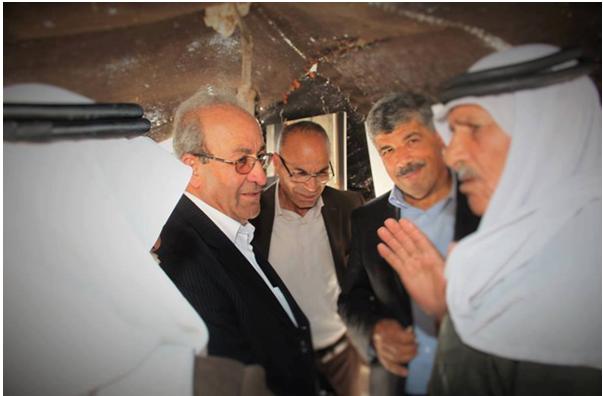Friends, family, and comrades of the Marxist thinker and leader Dr. Tayseer Arouri commemorated his legacy on Tuesday, April 11, at Naseeb Aziz Shaheen Auditorium at Birzeit University, where his work spanning more than five decades was witness to his various public involvements.

Tayseer Arouri (second from left) with residents of the Jordan Valley occupied by Israel (Photo: Palestinian People’s Party)
The ceremony started with the launch of the book TAYSEER: Recounting an Engaged Story Yet-to-be Twinned; a compilation of 33 testimonies that unravel the multiple facets of Amouri’s personality and reflect on milestones throughout his life. Included is a visual exhibition that further sheds light on his love for life, in spite of the challenges of his political career and circumstances of public engagement, underground work, administrative detention, exile, peace negotiations, endeavors in building community institutions, and uniting democratic forces among others.
Keynote addresses were delivered by persons who shared pivotal experiences with Tayseer Arouri and were interspersed with musical interludes and readings of some of Arouri’s writings, and other passages by contributors to the book. Speakers included, on behalf of Birzeit University, Assistant to the President Dr. Aziz Shawabkeh; on behalf of the Palestinian People’s Party, Secretary General Bassam Salhi; on behalf of the Israeli Communist Party, Secretary General Adel Amer; on behalf of the National Factions, Vice President of Fatah Mahmoud al-Aloul; on behalf of the High Arab Follow-Up Committee for Arab Citizens of Israel, Chairman and former Hadash MK Mohammad Barakeh; on behalf of colleagues in Civil Society Organisations and friends, Executive Director of the Jerusalem Legal Aid and Human Rights Centre, Issam Aruri, and; his life companion Amal Ghadban-Arouri.
Tayseer Arouri was born in 1946 in the village of Burham, near Ramallah. He obtained his high school diploma from the Hashemite School in Al-Bireh, ranking 1st in his school and 18th in the Jordanian Kingdom and was an activist in the underground Communist Youth. In light of his academic excellence and political activism, he was awarded a scholarship to continue higher education in the Soviet Union. He completed his Masters in Theoretical Physics and Mathematics from Lomonosov Moscow State University in 1973. He returned to work as a lecturer at Birzeit University, where he worked, with the exception of the years of imprisonment and exile, until his death.
Arouri was a Palestinian national figure and peace advocate, a prominent Marxist thinker and educator. From an early age, he became politically active in the service of his people and cause, and continued with perseverance for over fifty years. His contribution to the building and activation of popular mobilization frameworks such as grassroots organizations, empowerment of working people, and defending human rights was substantial.
When arrested in 1974 he was held in administrative detention for 45 consecutive months, under the allegation that he was “thinking of doing something against Israel.” After a wide popular campaign that reached international platforms demanding his release, Amnesty International declared him as Prisoner of Conscience. He was released in 1978, and returned to his teaching at Birzeit University.
Nevertheless, after his release Arouri’s persecution by the Israeli authorities persisted, based on his organization building and his work with community-based groups and institutions, and later for his leading role in the Unified National Leadership of the Intifada of 1987.
In August 1988, he was arrested again on the streets of Ramallah. Ten days later, he was informed of a deportation order against him and 26 other activists. Contrary to what was customary at the time, he read a self-written appeal before the Israeli Military Objections Committee refuting all claims against him and the deportation order.
Arouri’s battle against his deportation was met with significant international solidarity, resulting in pressure that brought the Israeli government to suspend its deportation policy for some years.
While deported and in exile, he continued work to building solidarity for the Palestinian cause. He played an influential role in the Palestine Liberation Organisation (PLO), and in peace talks held in Madrid and Washington.
Upon his return to Palestine, Arouri resumed his efforts to build platforms that help materialize the dream of freedom through education and human rights. He was involved in a number of civic, academic and political organizations and coalitions such as the Jerusalem Legal Aid and Human Rights Centre, the Palestinian Centre for Peace and Democracy, the Fuad Nassar Association for Development Studies and its Knowledge and Socialist Thought Institute, the Palestinian Campaign for the Academic and Cultural Boycott of Israel, the Municipal Committee for Naming and Numbering the Streets of Ramallah, among others.
Tayseer Arouri published many articles, some of which were compiled along with interviews with him and re-published in a book in 2013. That volume was meant to be his first, but became his only one, and bore his main message: “Defeats are Not Destined.” Amouri died on July 26th, 2016. He is survived by his wife Amal and their four children.


